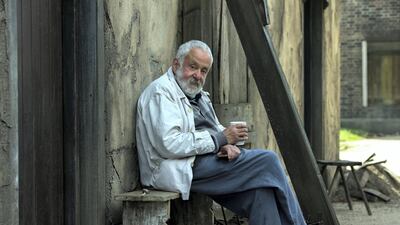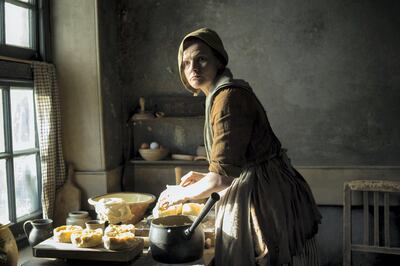Acclaimed British director Mike Leigh is not one for small talk. When we meet at Oxford Brookes University earlier this month, where he is headlining the Oxford Human Rights Festival with a screening and Q&A around his latest film, Peterloo, he shows that brevity is not only the soul of wit – it's also an effective way to establish boundaries and personal space.
That said, he is gracious with his time – he engages with dozens of the university's film students for two hours, introduces his film, endures several interviews, and then participates in a Q&A session with an audience of about 200.
It is fitting that he headlined this year's festival, the theme of which was "protest", given the subject of Peterloo. His fourth period piece, the film focuses on a demonstration held in 1819 in Manchester, in which English forces on horseback charged around 80,000 men, women and children attending a peaceful, pro-democracy march. The result: 18 people killed and hundreds more injured, followed by a severe crackdown on reformers.
Given the human rights setting, I start by saying that the film's harrowing, climactic scene of the cavalry charging into the crowds of defenceless protesters reminds me of the weekly Friday protests conducted by Palestinian communities in the West Bank in villages such as An Nabi Saleh and Bil'in today, whose marches to uphold their rights are invariably, ruthlessly suppressed by Israeli forces.
Brought up with lies
Leigh has for many years been a regular and prominent advocate in the UK for the boycott, divestment and sanctions (BDS) campaign called for by Palestinian civil society against Israel. His name and reputation help to give weight and exposure to related letters and appeals supporting Palestinian rights or condemning Israeli violations of international human rights law. But he didn’t always see it this way.
Having grown up in a socialist environment in which pro-Zionist sympathies were the norm, Leigh says: "We were brought up on things that we later realised were lies. We were told quite seriously that the Arabs, as they were erroneously called, never cultivated the land, and the Israelis did, so and that made it legitimate."
His journey took him "through layers of horror and disgust at what has happened, and it increasingly gets worse", he says. "Israel is evolving more and more into an apartheid state – and the world stands by and lets it happen. It is outrageous," he says.
Many BDS campaigners in Britain are frustrated that some artists may inherently support Palestinian human rights, but won't touch BDS. Leigh speculates that such artists are worried about the power of the pro-Israel lobby. "People who oppose BDS – it's because of the pro-Israel lobby, really. That's all there is to it. People are concerned about their profile. People should get out there and put their shoulders to the wheel and put their money where their mouth is."
Why he sides with Jeremy Corbyn
The same forces, Leigh adds, are behind cynical accusations that Labour leader Jeremy Corbyn is responsible for "endemic" anti-Semitism at the heart of the party. "The idea that Corbyn is anti-Semitic is ridiculous. It's an insult. Corbyn has fought racism all his life. Again, we're talking about things that are obvious. I'm resistant to pontificating the obvious that everybody knows," he says.
Should Corbyn speak up and defend his credentials more forcefully around these accusations of anti-Semitism?
“Leadership is a skill and a calling, and involves dealing with stuff. I have a lot of time for Jeremy Corbyn. I’ve come out and defended him and I will defend him. His heart’s in the right place. I think his morals are impeccable and so are his politics. Whether he could be tougher, more imaginative and more relentless as a leader is open to some debate.”
Speaking of a tougher and more relentless leader, Peterloo does seem to be a comment on the notion of history repeating itself. In the film there are examples of snooping, censorship, the curtailing of freedoms, all in the name of security and peace, according to those in power, issues that Theresa May has overseen and authorised as former Home Secretary and Prime Minister. Was Leigh's intention to use an old chapter in British history to reflect on the present?
"No, not specifically. Once we started to prepare the film in 2014 we found ourselves almost on a daily basis saying: 'This is actually increasingly relevant.' I'm not a journalist and what motivates me to make films is reflecting on matters you could call life. [As such,] it resonates with all kinds of aspects about what's happening in the world, inevitably."
What has history taught us?
There seems to be another issue, unconscious or otherwise, at the heart of this period film with parallels in today’s society – as we watch these poor characters fight for representation in Britain’s Parliament, have we really advanced much with enfranchisement? Or is it all tokenistic, with the real power still firmly in the hands of the few who wield tremendous influence upon us, such as multinationals and media empires and the algorithm data fodder we’ve become?
"That's a very complicated question," says Leigh, who objects to the "reductionist" nature of it. He does suggest, however, that "the people who were at Peterloo protesting for the vote – because only two per cent of the population had the vote – would be appalled and disgusted if they jumped into a time machine to discover that people today have the vote and don't use it.
"Similarly, in the film you see literate, articulate, working-class lads quoting the classics in their speeches to the crowd. These are guys who had no education. They were self-taught or learnt to read through Sunday School. All those guys would be appalled to discover how education, certainly in Britain, is treated cynically by so many people – they don't take it seriously."
Today's refugee crisis
The always-political Leigh then brings the conversation around to the plight of refugees. “The question of whether anything has changed is a difficult one, because here we are in the world of the internet – people know about things, people are informed about things in a way that’s unprecedented, and certainly compared with the insular world of 200 years ago."
But does he have an optimistic view of the world? "Has the world changed?," he asks, rhetorically. "There are so many things kicking off in so many directions that I think it's very difficult to talk in simple terms about whether things have got better or worse," says Leigh with a shrug.I think it's far too reductionist to start talking about whether it's changed in terms of people's voice. It plainly hasn't in many respects, given the quality of many people's lives. And here we are at a human rights festival – here we are in Britain – but there's a massive chunk of the world's population drifting about in refugee mode."
One thing’s for sure, he hasn’t changed, thankfully. His films continue to shine a light on both our inhumanity and humanity, and with great insight and beauty.


